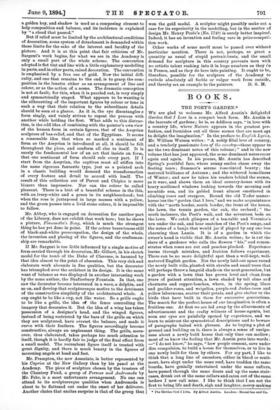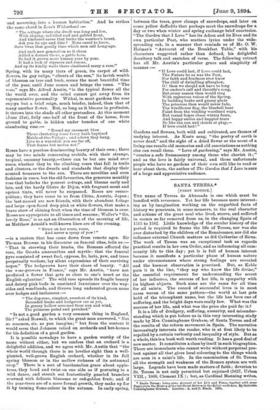BOOKS.
THE POET'S GARDEN.*
WE are glad to welcome Mr. Alfred Austin's delightful Garden that I Love in a compact book form. Mr. Austin is the laureate of gardens ; he is, as Addison says, "in love with a country life, where Nature appears in the greatest per- fection, and furnishes out all those scenes that are most apt to delight the imagination." In the preface to English Lyrics, Mr. William Watson writes : "A nobly filial love of country, and a tenderly passionate love of the country—these appear to me the two dominant notes of this volume ; " and in the new volume that has just appeared, the some dominant notes recur again and again. In his poems, Mr. Austin has described Spring's youthful face, where sunny smiles chase away the fleeting tears ; Summer's serene rose-tinted beauty ; the matured brilliance of Autumn ; and the withered homeliness of Winter ; and now he takes his readers behind the scenes, as it were, and shows them an ideal country-house with its heavy mullioned windows looking towards the morning and noontide sun, and its gabled front almost smothered in climbing roses and creepers. Round the old Tudor manor- house lies the" garden that I love," and we make acquaintance with the "north border, south border, the front of the house, the lawn, the tennis garden, the oak, the orchard ; '' the south inclosure, the Poet's walk, and the seventeen beds on the lawn. We catch glimpses of a tea-table and Veronica's urn under the oak, and hear snatches of the Poet's songs, and the notes of a banjo that would jar if played by any one less charming than Lamia. It is of a garden in which the owner's hand is visible that Mr. Austin writes ; he is rot the slave of a gardener who calls the flowers "his," and remon- strates when roses are cut and peaches plucked. Experience learns through mistakes, and fruition follows experiment. There can be no more delightful spot than a well-kept, well- matured English garden. Not the newly laid-out space round the newly built villa, planted with shrubs and small trees that will perhaps throw a languid shade on the next generation, but a garden with a lawn that has grown level and clean from years of patient attention, a lawn shaded by tall elms and chestnuts and copper-beeches, where, in the spring, lilacs and guelder-roses, and weigelias, purple-red Judas-trees and yellow laburnums, scatter their petals, and give shelter to the birds that have built in them for successive generations. The search for the perfect house of our imagination is often a fruitless one. At first we are led away by the allurements of advertisement and the crafty wiliness of house-agents, but soon our eyes are painfully opened by experience, and we learn to mistrust the symmetrical descriptions and to beware of paragraphs baited with phrases. As to buying a plot of ground and building on it, there is always a sense of unripe- nees about a newly built house that only time can mellow ; most of us know the feeling that Mr. Austin puts into words : —"I do not know," he says, "how people consent, save under dire compulsion, to build a house for themselves, or to live in one newly built for them by others. For my part, I like to think that a long line of ancestors, either in blood or senti- ment, have slept under the same roof, have trodden the same boards, have genially entertained under the same rafters, have passed through the same doors and up the same stair- cases, drunk out of the same cellars and eaten out of the same larders I now call mine. I like to think that I am not the first to bring life and death, sigh and laughter, merry-making • The Garden that I Love. By Alfred Austin. London; Macmillan and Co.
and mourning, into a human habitation." And he strikes the same chord in Love's Widowhood :— " The cottage where she dwelt was long and low, With sloping, red-tiled roof and gabled front, And timbered eaves that broke the weather's brunt. Ask you its age and date ? None cared to know, Save 'twas that goodly time which men call Long-ago.
And each new generation as it chose Added a dormer there, a gable here.
So had it grown more human year by year.
It had a look of ripeness and repose, And up its kindly walls there clambered many a rose."
Spring, with its many tints of green, its carpet of wild- flowers, its gay tulips, "clients of the sun," its lavish wealth of blossom on tree and bush, seems the most beautiful time of the year, until June comes and brings the roses. "The rose," says Mr. Alfred Austin, "is the typical flower all the the world over, and the mind cannot get away from its representative personality. Withal, in most gardens the rose enjoys but a brief reign, much briefer, indeed, than that of many another flower. But, so long as it blooms in profusion, it throws into the shade all other pretenders. At this moment (June 21st), fully one-half of the front of the house, from ground to gable, is hidden under bunches of one white 'clambering rose :—
" Round my casement blow Those clustering roses fancy hath baptised Maids-of-the-Village ; and adown they hang, Like to a waterfall you see far off,
That foams but moves not."
Roses have a peerless domineering beauty of their own ; there may be two minds concerning orchids, with their strange, tropical, uncanny beauty,—there can be but one mind over roses, whether they be the climbing roses that fall in trails and clusters, or the dwarfs and standards that display their scented treasures to the sun. There are novelties and even fashions in roses, but the old favourites, the generous monthly rose that bedecks the poorest cottage, and blooms early and late, and the hardy Gloire de Dijon, with fragrant scent and
apricot tints, will never be surpassed. Roses are cosmo- politan; they have come to us from China, Austria, Japan ;
the last-named are new friends, with their abundant foliage and large open.faced deep pink or white flowers, that make a brave show of shining fruit when the time of blossom is over.
Roses are appropriate to all times and seasons ; Waller's "Go, lovely Rose," is as apt an illustration of the morning of life, as Matthew Arnold's well-known lines are of the evening.
" Strew on her roses, roses, And never a spray of yew!"
—is a custom that has come down from remote ages. Sir Thomas Browne in his discourse on funeral rites, tells as That in strewing their tombs, the Romans affected the rose, the Greeks amaranthus and myrtle: that the funeral pyre consisted of sweet fuel, cypress, fir, larix, yew, and trees perpetually verdant, lay silent expressions of their surviving hopes." The hedgerows have their share of beauty. "All the rose-growers in France," says Mr. Austin, "have not produced a flower that gets so close to one's heart as the English eglantine." The wild rose spreads its fragile beauty and dainty pink buds in unstinted luxuriance over the way- sides and woodlands, and throws long undaunted green arms over hedges and inclosures The dog-rose, simplest, sweetest of its kind, Brocaded brake and hedgerow ere as yet, In grassy hollow screened from sun and wind, The primrose paled and perished."
"Is not a good garden a very common thing in England, Sir?" asked Boswell, to which the great man answered, "Not so common, sir, as you imagine;" but from the context it would seem that Johnson relied on orchards and hot-houses for his definition of a good garden.
It is possible nowadays to have a garden worthy of the name without either, but we confess that an orchard is a +lelightfal addition, and we agree with Mr. Austin that "the whole world through there is no lovelier sight than a well- planted, well-grown English orchard, whether in its full spring blossom or in the mellow richness of its autumnal crop." There is a sort of bacchanalian grace about apple. trees, they bend and twist on one side as if posturing in a wild dance, and stretch out fantastically gnarled branches crowned with delicate blossoms or red-golden fruit; and if the pear-trees are of a more formal growth, they make up for at by turning flame-colour in the autumn. In early spring, between the trees, grow clumps of snowdrops, and later on come yellow daffodils that perhaps meet the snowdrops for a day or two when winter and spring exchange brief courtesies. "The Garden that I Love" has its Adam and its Eves and its own particular Poet, who scatters lyrics under the wide- spreading oak, in a manner that reminds us of Mr. 0. W. Holmes's "Autocrat of the Breakfast Table," with his characters suggested rather than defined, his delightful desultory talk and snatches of verse. The following extract has all Mr. Austin's particular grace and simplicity of manner :—
"If Love could last, if Love could last, The Future be as was the Past, Nor faith and fondness ever know The chill of dwindling afterglow, 0! then we should not have to long For cuckoo's calf and throstle's song, But every season then would ring With rapturous voices of the Spring. In budding brake and grassy glade The primrose then would never fade, The windflower flag, the bluebell haze Faint from the winding woodland ways, But vernal hopes chase wintry fears, And happy smiles and happier tears Be like the sun and clouds at play,— If love could last!"
Gardens and flowers, both wild and cultivated, are themes of undying interest. As Keats sang, "the poetry of earth is never dead," and the sight of a dried flower or the scent of a living one recalls old memories and old associations as nothing else can recall them. "Love of gardening," says Mr. Austin, "creates a safe freemasonry among those who cherish it ;" and as the love is fairly universal, and those unfortunate people who have no gardens of their own still like to read or hear about them, the author of The Garden that I Love is sure of a large and appreciative audience.







































 Previous page
Previous page